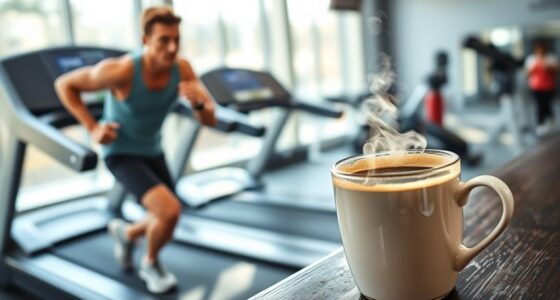Many believe coffee dehydrates you because of its caffeine content, but research shows that’s a myth. Moderate coffee consumption actually counts toward your daily fluid intake and doesn’t cause dehydration. While caffeine can have a diuretic effect, your body quickly adapts, especially if you’re a regular drinker. So, enjoying coffee in moderation is unlikely to dehydrate you. Keep exploring to understand how coffee fits into your hydration habits fully.
Key Takeaways
- Moderate coffee intake contributes to daily hydration, similar to water, with no significant dehydration risk.
- Caffeine has a diuretic effect, but regular drinkers develop tolerance, reducing dehydration concerns.
- The initial increased urination from coffee does not outweigh its overall fluid contribution.
- Excessive, rapid consumption of large amounts of coffee might cause dehydration, but typical intake is safe.
- Individual factors like age, health, and caffeine sensitivity influence how coffee affects hydration.

Many people wonder if drinking coffee leads to dehydration. It’s a common concern, especially since caffeine is often labeled as a diuretic. The idea is that coffee’s diuretic effect causes you to lose more fluids than you take in, potentially leading to dehydration. However, this belief is rooted in hydration myths that need clarification. Recent studies show that moderate coffee consumption doesn’t substantially dehydrate you. Instead, it can contribute to your daily fluid intake, just like water or other beverages.
Moderate coffee consumption contributes to hydration and does not cause dehydration.
The coffee’s diuretic effect is real but often overstated. When you drink coffee, caffeine stimulates your kidneys to produce more urine, which might make you think you’re losing too much fluid. But this effect is generally mild, especially in regular coffee drinkers who build up a tolerance to caffeine’s diuretic properties. So, while a cup of coffee might make you pee a little more initially, it doesn’t mean you’re losing more overall fluids than you’re consuming. Your body adapts, and the net fluid balance remains positive. This is why many health experts argue that coffee can be counted toward your daily hydration needs.
Hydration myths about coffee abound, often making people believe they need to compensate for coffee’s supposed dehydrating effects by drinking extra water. But research indicates that the fluid in coffee still contributes to hydration. The initial diuretic response doesn’t outweigh the fluid you gain from drinking coffee. As long as you’re not consuming excessive amounts—say, several liters in a short period—the impact on your hydration levels is minimal.
It’s worth noting that individual differences matter. Factors like your age, caffeine tolerance, and overall health influence how your body responds to coffee. If you’re sensitive to caffeine or have certain medical conditions, you might experience more pronounced diuretic effects. But, for most people, drinking coffee in moderation is safe and can be part of a healthy hydration routine.
In essence, coffee’s diuretic effect isn’t enough to cause dehydration if you’re consuming it regularly and in reasonable amounts. The hydration myths surrounding coffee are just that—myths. You don’t need to avoid coffee to stay hydrated. Instead, you can enjoy your favorite brew, knowing it contributes to your fluid intake just like other beverages. Just remember to listen to your body and balance your coffee consumption with plenty of water throughout the day for ideal hydration and health.
Frequently Asked Questions
Can Decaffeinated Coffee Still Affect Hydration Levels?
Decaffeination effects are minimal, so decaffeinated coffee generally has little to no hydration impact. Since it contains considerably less caffeine, it doesn’t act as a diuretic like regular coffee. You can enjoy decaf without worrying about dehydration, as it still provides fluids that contribute to your daily hydration needs. Just remember, moderation is key, and balancing beverages with water helps maintain ideal hydration levels.
How Much Coffee Is Safe Before Risking Dehydration?
Imagine a steady stream of coffee flowing into your day, each cup influencing your caffeine metabolism and hydration balance. You wonder, how much is safe before dehydration risks tip the scales? Generally, up to 3-4 cups daily keeps caffeine metabolism steady without upsetting hydration. Beyond that, you might start to lose the delicate hydration balance, risking dehydration. Keep track, listen to your body, and enjoy coffee responsibly.
Does Coffee Intake Vary Hydration Needs for Athletes?
You might wonder if your coffee intake affects your hydration balance and athletic performance. While caffeine is a diuretic, moderate coffee consumption doesn’t substantially impact hydration needs for athletes. Your body adapts, and the fluid from coffee counts toward your daily hydration. To optimize performance, balance coffee with plenty of water, ensuring your hydration levels support your athletic goals without risking dehydration.
Are There Differences in Dehydration Risk Between Hot and Cold Coffee?
Oh, the eternal debate—hot vs. cold coffee and dehydration! Ironically, you’d think hot beverage temperature might increase dehydration risk, but it actually influences how quickly you drink and absorb fluids. Cold coffee, with its invigorating appeal, might make you sip more, subtly balancing hydration. So, temperature effects aren’t just about comfort; they subtly impact your hydration, making both options pretty manageable in keeping you hydrated.
How Does Coffee Consumption During Illness Impact Hydration?
When you’re ill, drinking coffee can affect your hydration balance, but it doesn’t necessarily hinder illness recovery. Caffeine acts as a mild diuretic, so moderate coffee intake might increase urination. However, your fluid intake from coffee still contributes to overall hydration. If you enjoy coffee during illness, balance it with plenty of water to maintain hydration and support your recovery. Listen to your body’s signals and adjust accordingly.
Conclusion
So, next time you sip that steaming cup, remember it’s not draining your hydration tank. Think of your body as a lush garden—your coffee acts like a gentle rain, invigorating rather than drying out. With moderation, caffeine can be part of your daily flow without turning your hydration into a desert. Enjoy your brew, knowing it’s more friend than foe—fueling your day, not draining your well. Cheers to balanced sipping!









